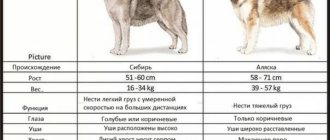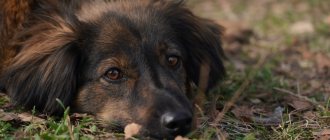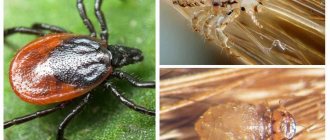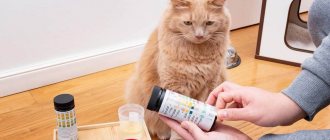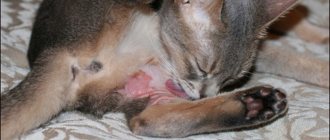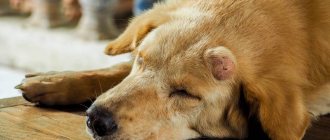Diarrhea in a puppy is not a disease, but a sign of a malfunction in the body. If such a nuisance occurs, you need to monitor how often diarrhea occurs and what symptoms accompany it. An animal's stool may return to normal on its own, but sometimes diarrhea indicates a serious illness. In this case, examination in a clinic is required; the sooner treatment is prescribed, the better.
Why might a puppy have diarrhea?
Any owner should be aware that diarrhea can be common in puppies. And sometimes this is normal and absolutely not scary. Therefore, if your puppy has diarrhea, you first need to find out the cause of this phenomenon.
So, what can cause this condition:
- Change of food or new treats. Puppies have not yet fully developed their bodies, so even minor but sudden transitions can cause diarrhea. Solution: introduce all new foods little by little over 7-10 days.
- Stress. The puppy is just getting used to his new home and is easily startled or surprised. Everything new causes stress - in this case, you just need to give the puppy time to adapt and try to help him get used to it.
- Bad food. Spoiled food, unusual food from the table, dirt picked up on the street - all this can cause stomach upset in menstruation and not only puppies. In this case, you will need to help your pet, and you can read how below.
- Reaction to lactose. Newborn puppies are often intolerant to lactose contained in mother's milk. In this case, it is necessary to consult a veterinarian and transfer the puppy to a special diet.
- Intolerance to some food components. Dogs have reactions to certain types of protein; this can be determined by exclusion and after consultation with a veterinarian. Most often, in addition to diarrhea, the puppy develops rashes and redness on the skin or even in the ear.
- Binge eating. Observe feeding standards and do not give the puppy more food than prescribed.
In general, diarrhea occurs in acute forms (lasting 1–2 days) and chronic forms (lasting more than 2 weeks). Only a veterinarian can diagnose the form, but if the symptoms listed above do not require additional complications, the help of a veterinarian will not be required.
Diarrhea can also be a symptom of more serious disorders in the body:
- Parasites . Puppies can get them from a mother who has not been treated, or from their first experiments in the “big world”. The first treatment for worms in a puppy should occur at the age of 3 weeks. If you suspect an infection, you should contact your veterinarian.
- Infectious diseases. For example, parvovirus enteritis is a dangerous disease that can be fatal. During it there may be fever, lethargy and pain. Therefore, it is necessary to vaccinate on time.
Causes
Puppies often have diarrhea due to poor nutrition:
- fatty foods;
- overeating (puppies cannot control their own need for food);
- sudden transition to another type of food;
- spoiled food (expired, lost as a result of improper storage);
- feeding foods that are unsuitable for dogs (salted, smoked, containing food coloring and flavoring additives).
When walking with your puppy, make sure that he does not pick up anything from the ground. Diarrhea can be caused by spoiled food that your dog finds on the street.
Other causes of diarrhea:
- worms, infection with which can occur in the womb;
- allergies to medications or food;
- side effects of medications;
- chemical poisoning, with vomiting added to diarrhea;
- change of teeth, which begins at approximately 3-4 months of age;
- diseases of the digestive system, which may include diarrhea with blood or undigested food particles;
- infectious diseases (enteritis, plague and others), often accompanied by an increase or decrease in temperature;
- a puppy swallowing an inedible object.
If the puppy is separated from its mother early or she does not have milk, diarrhea may be a reaction to inappropriate food. In this case, it is recommended to give your pet ready-made premium mixtures.
A one-month-old puppy who is being introduced to complementary foods does not know how to control his appetite. When babies overeat, they often experience bloating, diarrhea and vomiting.
Complementary foods should be introduced gradually, in small portions and at regular intervals - 5-6 times a day.
If the dog owner can adjust the diet, wait out the process of changing teeth, and carry out deworming himself, then in other cases it is necessary to contact a veterinary clinic.
What to do if your puppy has vomiting and diarrhea
A puppy can become poisoned by something it picks up on the street or steals from a table. In this case, diarrhea may be accompanied by vomiting, and you may also notice that your stomach is rumbling. If this doesn’t last that long, and the dog only vomited once or twice and you know for sure that the pet really ate something, then you don’t have to contact the veterinarian and solve the problem yourself.
To do this, you need to know what to give your puppy for diarrhea. You can also give your dog activated charcoal at a dosage of 1 tablet per 10 kg. You can also use “Smecta” - one sachet dissolved in warm water.
Also, make sure your dog drinks and stays hydrated. Important: you should not feed your dog immediately after vomiting. It's better to wait a few hours.
However, if you suddenly notice that in addition to diarrhea and vomiting, your dog also has seizures, fever, and loss of appetite, you should immediately consult a doctor.
When to see a doctor
Diarrhea in dogs can indicate serious illness. You should consult a doctor if you have the following symptoms:
- bloody diarrhea;
- diarrhea with vomiting;
- low, high or unstable body temperature of the puppy;
- weakness;
- refusal of water.
In these cases, it is necessary to conduct an examination and diagnose the cause as early as possible.
If your pet is active and does not refuse food, you can stop diarrhea at home. However, if a puppy’s diarrhea lasts more than two days, even if the dog is in good health, consultation with a specialist is necessary.
What to do if your puppy's stool is a different color
Puppies may experience changes in the color of their stool. Remember, if the puppy has eaten something “colored”, this is normal. But if the stool takes on a color “just like that,” you should contact your veterinarian.
- Yellow stool in newborn pets is due to their dairy diet. If your pet eats puppy food, then it may be an intolerance to some components or a disease of the small intestine.
- Green color may indicate gastrointestinal obstruction. For example, if a toy is stuck in the stomach. Urgent veterinary intervention is required.
- White color may indicate problems with the gallbladder and liver.
- Black color can be a symptom of ulcers and erosions in the stomach. This is a dangerous sign that requires you to contact your veterinarian.
- Watery diarrhea occurs with poisoning and infections.
Diarrhea medications for dogs
There are three groups of drugs that can stop diarrhea:
- Sorbents - absorb harmful compounds, pathogenic bacteria and remove them along with feces.
- Antimicrobials – inhibit the growth and destroy harmful microorganisms.
- Probiotics – contain live beneficial bacteria, displace pathogenic microbes in the gastrointestinal tract and restore normal microflora.
After acute poisoning with debilitating diarrhea, you can inject a course of the stimulant solution Catozal, it will help you recover faster.
It is safer to treat a dog with veterinary drugs, they have fewer side effects, the exact dosage is already written in the instructions. If the required medicine is not found, it is replaced with a human drug.
EnteroZOO for dogs
The medicine is available in the form of a paste based on an organosilicon compound. This porous substance, like a sponge, absorbs bacteria, toxins, and allergens. EnteroZoo is not absorbed into the blood, does not affect the stomach or intestines, and does not change the microflora.
For dogs and puppies, the medicine is given twice a day, the dose is calculated by body weight in teaspoons, where 5 g of paste is placed:
| Dog weight, kg | Single dose, tsp. |
| up to 4 | 1 |
| 4 – 15 | 2 |
| 15 – 50 | 3 |
| 50+ | 4 or 1 tbsp. l. and 1 tsp. |
The medicine is injected directly into the mouth closer to the root of the tongue or mixed with water and poured through a syringe. The timing of admission depends on the severity of the animal’s condition:
- acute poisoning 3 – 5 days;
- intestinal infections, food allergies, gastrointestinal diseases - up to 3 weeks;
- for prevention – up to 14 days.
Animals respond normally to the medicine. It has a neutral taste and smell, and contains no dyes, sweeteners, or preservatives. The drug combines well with other medications, there are no contraindications.
EnteroZoo is similar in composition, release form, and therapeutic effect to the human medicine Enterosgel. It is approved for the treatment of dogs. The dosage regimen for the drugs is the same, but the dose of Enterosgel is halved.
Diarkan for dogs
Diarcan for diarrhea in dogs.
The main component of the drug is the antimicrobial substance sulfaguanidine, which suppresses pathogenic bacteria. Ratania extract contained in the drug envelops the mucous membranes, forms a protective film, and prevents toxic substances from penetrating the bloodstream.
The drug helps with bacterial intestinal infections when the dog has eaten stale food or picked up discarded food on the street.
Diarcan is available in the form of sugar cubes; animals readily eat it with food, water or from the hand. The medicine is given 2 times a day at equal time intervals.
| Dog weight, kg | Single dose, cube |
| Up to 5 | 0,5 |
| 5 – 15 | 1 |
| 15 – 30 | 1,5 |
| 30+ | 2 |
The drug is continued until the diarrhea stops and for another 1 day, the maximum course is 5 days. Without consulting a veterinarian, puppies weighing up to 1 kg, pregnant dogs, and animals with kidney and liver diseases should not be treated with Diarcan.
You can replace Diarcan with Enterofuril from a regular pharmacy. It is available in powder form in gelatin capsules and suspension. It is more convenient for dogs to use the suspension; it tastes sweet, and animals accept it without resistance.
Enterofuril is given twice a day at the rate of 1 ml per 2.5 kg of body weight. This amount is difficult to measure with a spoon, so use a 5 or 10 ml syringe. The course of treatment lasts a week.
How is the diagnosis carried out?
To make a correct diagnosis, your veterinarian needs to know:
- how long does diarrhea last?
- what does the chair look like?
- whether there is mucus or blood in it;
- were there any changes in diet?
Therefore, you can take a stool sample with you to speed up diagnosis. Depending on what exactly the veterinarian expects, he will select a list of tests and examinations.
Your dog has loose stools with yellow mucus: Prevention
To prevent gastrointestinal disorders in dogs, you should follow these rules:
- Monitor your dog's diet. Do not use food that is of low quality and not intended for your pet.
- Deworming 3-4 times a year, even if your miniature Chihuahua does not walk outside.
- Vaccination against infections annually. If you don’t want to go to the clinic, you can call a doctor for a fee.
- Buy a puppy with vaccinations, preferably older than three months and from a trusted place: close friends, shelter, nursery.
- Regularly examine pets older than 5 years or with chronic diseases. At least once a year.
- If your dog tends to pick up on the street ( read how to stop it here ), then wear a muzzle for walks or use the services of a dog handler who will help correct the pet’s behavior.
- Explain to grandparents and children that the dog should not be fed.
Quantity
A dog has yellow diarrhea with mucus: Mechanism of development
Diarrhea (diarrhea) is a condition that is not normal for the body and is characterized by an increase in the amount of feces. This is mainly due to an increase in the water component, which becomes 60-90%.
Also, with diarrhea, defecation (separation of intestinal contents) becomes more frequent, more than 4-5 times a day.
Why does diarrhea occur? Under the influence of various factors, the absorption of substances in the intestines, including water, is impaired, peristalsis is accelerated, and an inflammatory process occurs.
In this case, the chair can be painted in different colors:
- Yellow . For diseases of internal organs.
- Green . With excessive amounts of bile.
- Red . Bleeding of the large intestine.
- Black . Bleeding in the stomach or small intestine.
- White . Impaired flow of bile.
Some medications that a dog takes can affect the color; for example, after activated charcoal, you should not be surprised by black feces.
The color of food also directly affects what it turns into after digestion.
By its nature, diarrhea can be infectious or non-infectious. The course is acute and chronic. With the latter type, diarrhea lasts for several weeks or even months.
Dog has diarrhea with mucus. Moscow. How to choose a clinic
We can talk about damage to the intestinal walls if the dog has diarrhea with mucus. There are many clinics in Moscow where you can go to with such a problem.
What you should pay attention to when choosing a veterinary center:
- First of all, read the reviews.
- See where it is easier and faster for you to get to with your dog. After all, a long journey is not good for a dog with diarrhea. An incident can happen in transport.
- The advantage is the presence of a specialist - a gastroenterologist who will help a dog with diarrhea .
- It is also very convenient if you have all the necessary conditions for diagnostics, and you additionally do not need to travel to the other end of the city, for example, to conduct an ultrasound.
- Please note that many clinics offer promotions and discounts, and you can get a savings card. This is very convenient if a course of procedures is expected and you need to buy medical nutrition.
- Having your own pharmacy is also a big plus. Everything you need can be purchased immediately.
- Hospital In some cases, your dog may require 24-hour care in a clinic. This is also convenient for working owners who cannot care for sick pets during the day.
If your dog has diarrhea due to mucus in Moscow, the following metropolitan veterinary clinics will help:
- zoostatus.ru
- dobrovet.ru
- vetcentr.ru
- svoydoctor.ru
- zooadrenalin.ru
- dobruy-doctor.ru
- veterinary-help.ru
- veterinarianmoscow.rf
IF YOUR DOG HAS AN ALLERGY, THIS FOOD IS GOOD FOR YOU
